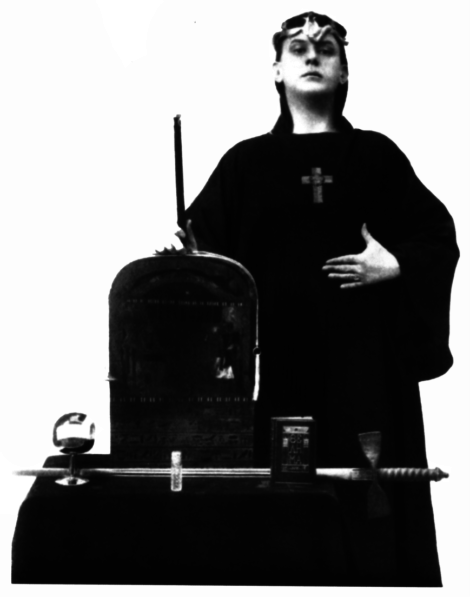
Aleister Crowley posing as Magus with the Stelae of Revealing and magical weapons: wand, chalice, sword and the Book of the Law – the Liber Al Vel Legis
On March 16, 1904, in the King’s Chamber at the Great Pyramid of Giza, Aleister Crowley attempted to show the Sylphs to his wife, Rose Edith Kelly, during the Bornless Ritual. She couldn’t see them, but she entered a trance and repeatedly told her husband: “They’re waiting for you!” Crowley didn’t pay much attention to it until two days later when, on March 18, after invoking god Thoth, his Rose told him that the one waiting for him was Horus. To confirm this, Crowley took her to the Bulaq Museum which was nearby their honeymoon suite, where he asked her to point out Hours to him. After passing by many depictions of the Egyptian god, Rose pointed to the depiction of Horus on the stele of Ankh-ef-en-Khonsu, also known as the Stele of Revealing.
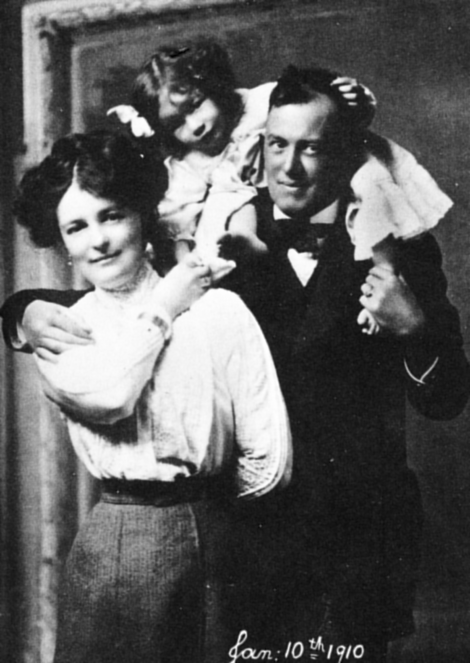
Family father: Aleister Crowley with Rose Edith Kelly and daughter Lola Zaza. If the dating is correct (1910), the photo was taken one year after the divorce (1909).
At the time, the stele was numbered 666, the number of the Beast, which was of significance to Crowley since his childhood. Following this event, on March 20, Crowley invoked Horus successfully, and 3 days later »he« began translating the hieroglyphs on the Stele of Revealing until April 7, when Rose instructed Crowley to enter the “temple” at noon for an hour over the course of the following three days and write down what he heard. On the 8th, 9th, and 10th of April 1904, in the heat and mystical fire of Egypt, in Cairo, Aleister Crowley wrote the book which ushered in the new Aeon of Horus and which would become the central scripture of a new religious movement known as Thelema. Under the directions of his wife, Rose Edith Kelly, during the three days, Crowley sat in his room at noon and spent an hour writing down messages for mankind dictated by a shadow behind him. The shadow was the non-physical intelligence Aiwass, the minister of Hoor-paar-kraat, and Crowley’s own Holy Guardian Angel. In his book, “The Equinox of the Gods” from 1913, Crowley describes the voice and presence that spoke to him:
»The Voice of Aiwass came apparently from over my left shoulder, from the furthest corner of the room. It seemed to echo itself in my physical heart in a very strange manner, hard to describe. I have noticed a similar phenomenon when I have been waiting for a message fraught with great hope or dread. The voice was passionately poured, as if Aiwass were alert about the time-limit … The voice was of deep timbre, musical and expressive, its tones solemn, voluptuous, tender, fierce or aught else as suited the moods of the message. Not bass – perhaps a rich tenor or baritone. The English was free of either native or foreign accent, perfectly pure of local or caste mannerisms, thus startling and even uncanny at first hearing. I had a strong impression that the speaker was actually in the corner where he seemed to be, in a body of ›fine matter‹, transparent as a veil of gauze, or a cloud of incense-smoke. He seemed to be a tall, dark man in his thirties, well-knit, active and strong, with the face of a savage king, and eyes veiled lest their gaze should destroy what they saw. The dress was not Arab; it suggested Assyria or Persia, but very vaguely. I took little note of it, for to me at that time Aiwass was an ›angel‹ such as I had often seen in visions, a being purely astral«.

The original of the Stele of Revelation, today numbered Cairo A 9422. At Crowley’s time numbered Bulaq 666. It shows the stele owner Ankh-ef-en-Khonsu before Ra-Horakhty (“Ra, who is Horus of the Two Horizons”), the winged sun Hadit (or Egyptian: Behedeti), and Nuit.
The word of Aiwass, the shadow behind Crowley, is the »Liber AL vel Legis« or »The Book of the Law«. For me personally, after a dive in the obligatory and foundational western classics of occultism, the Book of the Law was one of the very first books on modern magick which I desired a lot when I was twelve, and the first religious text (maybe with the exception of the Edda and some Egyptian myths) which I would have read until that age. But back then, because of my young age, the owners of the occult bookshop refused to sell this title to me so I tactically opted for Crowley’s »Eight Lecture’s on Yoga« until I nevertheless ordered the book I desired so much in another bookstore, which was not aware of its contents. Some years later when I was sixteen, I was already working myself in that occult bookstore, and everybody (nearly) forgot the whole episode – obviously, the Liber AL did not spoil me. Even today it is sometimes hard for me to understand how such a small book can cause so many and so big controversies. As far as »Aiwass« or »Aiwaz« is concerned, already Crowley himself puzzled about the ontological status of the voice. Not having been in a trance, he claims to have been compelled to write, even though he was conscious and heard the disembodied voice of Aiwass clearly. In »The Equinox of the Gods« Alick concludes that it cannot be a mere psychological phenomenon:
»Of course I wrote them, ink on paper, in the material sense; but they are not My words, unless Aiwaz be taken to be no more than my subconscious self, or some part of it: in that case, my conscious self being ignorant of the Truth in the Book and hostile to most of the ethics and philosophy of the Book, Aiwaz is a severely suppressed part of me. Such a theory would further imply that I am, unknown to myself, possessed of all sorts of praeternatural knowledge and power. The law of Parsimony of Thought (Sir W. Hamilton) appears in rebuttal. Aiwaz calls Himself ›the minister of Hoor-parr- Kraat‹, the twin of Heru-Ra-Ha. This is the dual form of Horus, child of Isis and Osiris. If so, the theorist must suggest a reason for this explosive yet ceremonially controlled manifestation, and furnish and explanation of the dovetailing of Events in subsequent years with His word written and published. In any case, whatever ›Aiwaz‹ is, ›Aiwaz‹ is an Intelligence possessed of power and knowledge absolutely beyond human experience; and therefore, Aiwaz is a Being worthy, as the current use of the word allows, of the title of a God, yea verily and amen, of a God.«
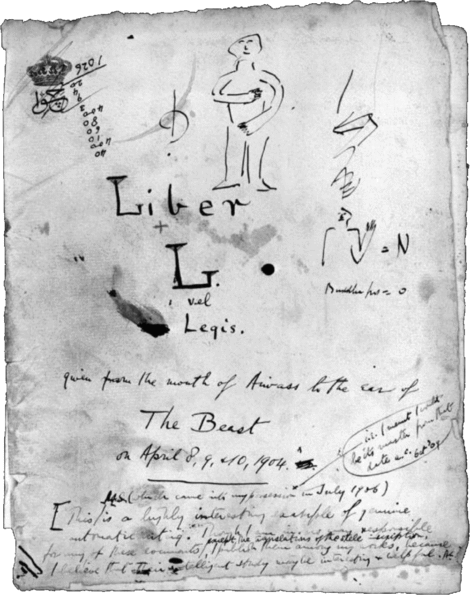
The cover sheet of the handwritten manuscript for the later Liber Legis, published by Aleister Crowley
Besides Crowley’s refusal to accept the Liber AL’s source to be psychological the quote shows another interesting aspect, some forget about today: Aleister Crowley, the man, struggled quite a bit with the contents of the »Book of the Law« as dictated by Aiwass to the ears of »Master Therion«.
The Lost Manuscript
In 1904, Crowley rejected the word of Aiwass or the »Law«, as stated in his – probably the world’s first and last – autohagiography »The Confessions of Aleister Crowley«: »The fact of the matter was that I resented The Book of the Law with my whole soul. For one thing, it knocked my Buddhism completely on the head. … I was bitterly opposed to the principles of the Book on almost every point of morality. The third chapter seemed to me gratuitously atrocious«. Furthermore, he planned to just publish the thing in his third volume of »Collected Works« from 1907, of which he stated that: »The Book of the Law annoyed me; I was still obsessed by the idea that secrecy was necessary to a magical document, that publication would destroy its importance. I determined, in a mood which I can only describe as a fit of ill temper, to publish The Book of the Law, and then get rid of it for ever«. At this time he described the Liber AL as »interesting example of genuine automatic writing« and denied any further responsibility for their contents, with the small exception of »the verse translations of the stele inscriptions«.
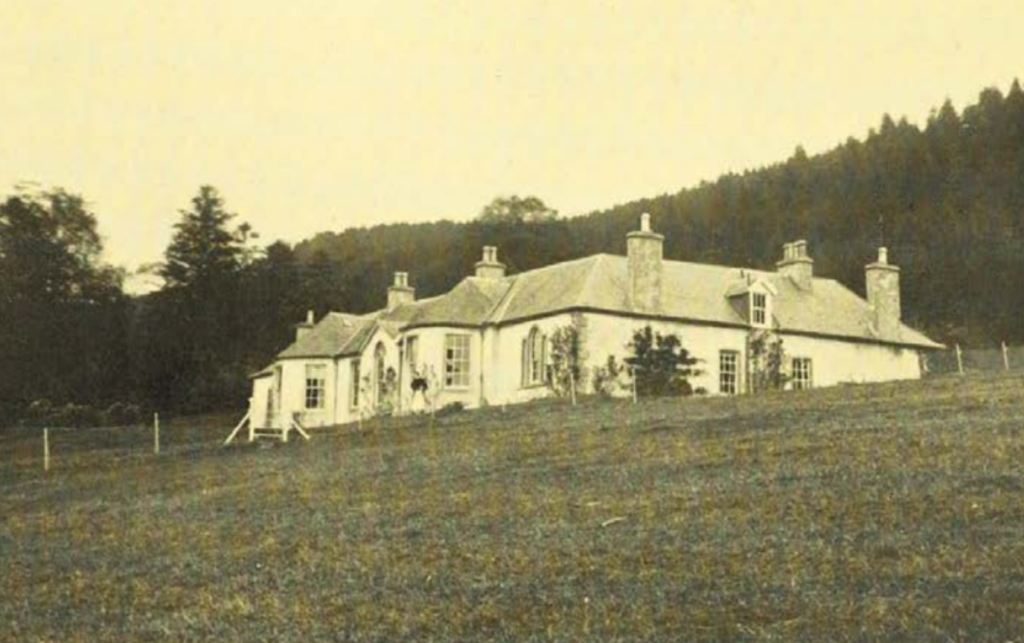
Boleskine house in 1912, photograph taken by Aleister Crowley. Crowley purchased the Scottish manor house in 1899 for his »Sacred Magic of Abramelin« operations, but also served as residence for »Lord Boleskine«. In 1909 Crowley rediscovered here the manuscript for the Liber Legis.
But, he changed his mind and did not publish the book for another two years, instead, he claims to have lost the original manuscript. He found it again on June 28, 1909, in his loft at Boleskine House in a brown envelope, while he was searching for his skis. He was uplifted by this event, which followed a series of misfortunes in his life, and he finally felt that it was time to publish the book and surrender to his true will.
The First Editions of the Liber Al Vel Legis
The book of the law appeared already in the same year, 1909, privately published with a set of other writings and commonly labeled as »Thelema« – ΘΕΛΗΜΑ. The next edition of only 11 copies was due in 1925 in Tunis. This »Tunis edition« is the first to be accompanied by a warning, nowadays famous as the »Tunis comment« on the Liber Legis:
Do what thou wilt shall be the whole of the Law. The study of this Book is forbidden. It is wise to destroy this copy after the first reading. Whosoever disregards this does so at his own risk and peril. These are most dire. Those who discuss the contents of this Book are to be shunned by all, as centres of pestilence. All questions of the Law are to be decided only by appeal to my writings, each for himself. There is no law beyond Do what thou wilt. Love is the law, love under will. The priest of the princes, Ankh-ef-en-Khonsu
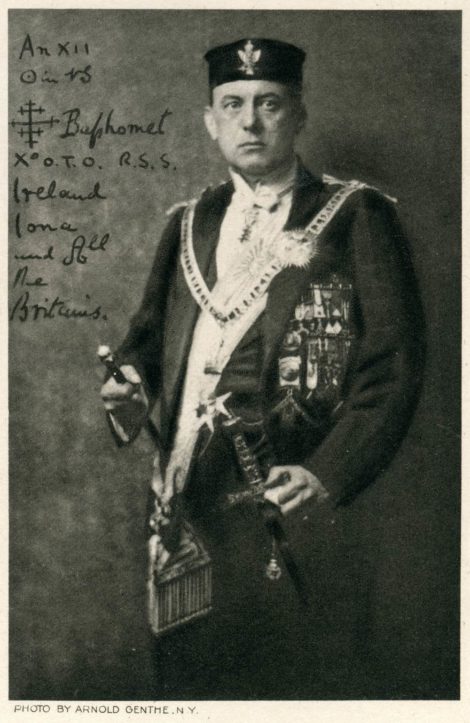
»World Teacher«: Aleister Crowley as »Baphomet«, the 10° of the OTO in 1919. The text reads as follows: An XII, ☉ in ♑ Baphomet; X° O.T.O. R.S.S. Ireland Iona and All the Britains.
Despite the tiny circulation the impact of this small book showed itself to be enormous already in the same year of its appearance: Aleister Crowley claimed at the Weida Conference in 1925 the title of the OHO of the OTO (»Outer Head of the Order«, meaning the international leader of the order Ordo Templi Orientis). In Crowley’s own, obviously exaggerated and deeply subjective accounts, this conference was attended by a large number of official delegates from various Rosicrucian and other occult orders, which would have come there on behalf of their orders to accept the Law of Thelema and Aleister Crowley as spiritual world leader of the new Aeon – the very much awaited Age of Aquarius, which indeed deeply preoccupied the Esoteric Scene back then. More credible accounts draw a slightly different picture: Crowley visited Heinrich Traenker’s during summer 1925 upon the latter’s invitation, but blatant misusing his hospitality. Traenker, the leader of the German OTO wanted to discuss with Aleister Crowley, the leader of British OTO the question of international leadership – a position known as OHO, which was vacant after the initiator Theodor Reuss had passed away in 1923 and left the question of further international leadership open. Another item which was discussed was the law of Thelema and its acceptance in the OTO. Traenker was obviously naive and unprepared for Crowley’s strong (ruthless) commitment to overtake leadership. Soon all kind of arguments between the participants arose (notably about women and money) and the result was that Traenker’s former partner Karl Germer joined Crowley henceforth, who successfully claimed the title of the OHO and left Traenker with a damaged reputation caused by an aggressive slander campaign by Crowley. Crowley did not only overtake the OTO, but as a consequence of the bad light shed on Traenker and the internal quarrels to follow, the Pansophical lodge practically shut down in 1926.
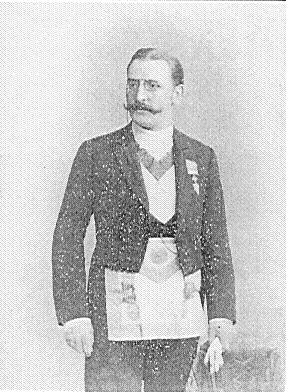
Theodor Reuss and Carl Kellner founded the OTO in 1906. The latter died soon after, so Reuss remained the sole leader of the new, tantric esoteric, Illuminati order. Reuss died in 1923, leaving Crowley as the British leader of the OTO and Traenker as the German leader of the OTO. Crowley claimed Reuss designated him already in 1921 as his successor but never could back up his claim.
Its successor was the Fraternitas Saturni, founded and lead by Traenker’s former follower Eugen Grosche and became the most influential, known magical orders in Germany during the 20th century. While Grosche kept his lodge name Gregor A. Gregorius, the Fraternitas Saturni accepted henceforth the law of Thelema, though, without accepting Crowley as a person being related to their order. Maybe Grosche understood in Weida, that it is wise to keep Crowley – the person – distant, but maybe it was also the Beast, who understood that Gregorius would be no easy victim and that messing with him would not be worthwhile. Thus, the Fraternitas Saturni became the first non-Crowley thelemic society. Karl Germer, on the other hand, remained loyal to Crowley and both brought the OTO to America into a colorful future. This debut at the Weida conference is symptomatic for Aleister Crowley and the Liber Al. While Uncle Al has by no means lost the capacity to rile up both occultists and non-occultists alike and to divide them like no other, the Liber AL pretty much stands for itself since this conference and sometimes it is able to unite. And if it does not unite through its content, at least through the mere fact that until today, there is virtually no occultist who would not have an (usually strong) opinion about either Crowley, the law, or both. Even Franz Bardon makes a reference to the law in his first book (»Love is Law, but Love under will«).
The Law of Thelema
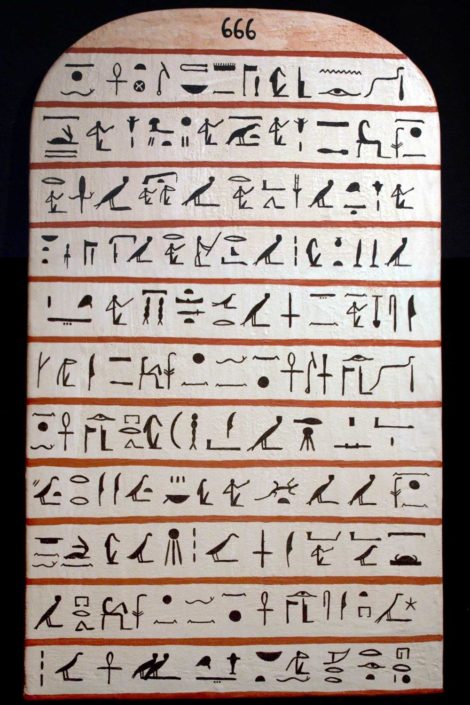
The backside of the Stele of Revelation, preceding the three books of the Liber Legis. Crowley met in Cairo with Egyptologist Émile Charles Albert Brugsch , who had an assistant translate the text for Crowley.
»Do what thou wilt shall be the whole of the Law. Love is the law, love under will«. This is the law of Thelema, which Liber AL conveys to its readers in the three chapters therein. Although Aiwass was the one heard by Crowley, each chapter is spoken by a different aspect of a trinity which articulates itself through Aiwass. The first chapter is spoken by Nuit, the Egyptian goddess of the sky, the star bearing woman arching the earth, mother to Osiris and Isis, Seth and Nephthys: the »Queen of Infinite Space«, the female aspect who Crowley calls »Lady of the Starry Heaven, who is also Matter in its deepest metaphysical sense, who is the infinite in whom all we live and move and have our being«. Nuit introduces herself and the »Law for All« in poetic verses, metaphors and instructions on her symbols: »I give unimaginable joys on earth: certainty, not faith, while in life, upon death; peace unutterable, rest, ecstasy; nor do I demand aught in sacrifice«. (AL I:58) The second chapter is spoken by Hadit, the male aspect, appearing as a winged sun on the Stele of Revelation, he is the sun god, the prime representation of a star, the spirit of the inner self, the Secret Seed, he is at flame at the core of matter (who is Nuit) and he represents Will: »I am the secret Serpent coiled about to spring: in my coiling there is joy. If I lift up my head, I and my Nuit are one. If I droop down mine head, and shoot forth venom, then is rapture of the earth, and I and the earth are one«. (AL II:26) The third chapter is presented by Ra-Hoor-Khuit or »Horus is on the Horizon«. He belongs to Heru-ra-ha, a syncretistic deity, composed of an active and a passive aspect: the active aspect is the Conquering Child – Ra-Hoor-Khuit, complemented by the passive aspect Hoor-paar-kraat. Hoor-paar-kraat or Greek Harpocrates meaning »Horus the Child«. Harpocrates represents childhood and his gesture is a finger held to the lips. The Greek interpreted this Egyptian mudra as sign for silence, though the correct interpretation is childhood. We find the Greek (mis-)conception again in the Golden Dawn. His brother, the active part Ra-Hoor-Khuit is the conquering child and a god of war and vengeance who instructs: »Fear not at all; fear neither men nor Fates, nor gods, nor anything. Money fear not, nor laughter of the folk folly, nor any other power in heaven or upon the earth or under the earth. Nu is your refuge as Hadit your light; and I am the strength, force, vigor, of your arms« (AL III:17). He is also the author of some of my favorite verses
»I am in a secret fourfold word, the blasphemy against all gods of men. Curse them! Curse them! Curse them! With my Hawk’s head I peck at the eyes of Jesus as he hangs upon the cross. I flap my wings in the face of Mohammed & blind him. With my claws I tear out the flesh of the Indian and the Buddhist, Mongol and Din« (AL III:49ff)
The Liber AL – A Fraud?
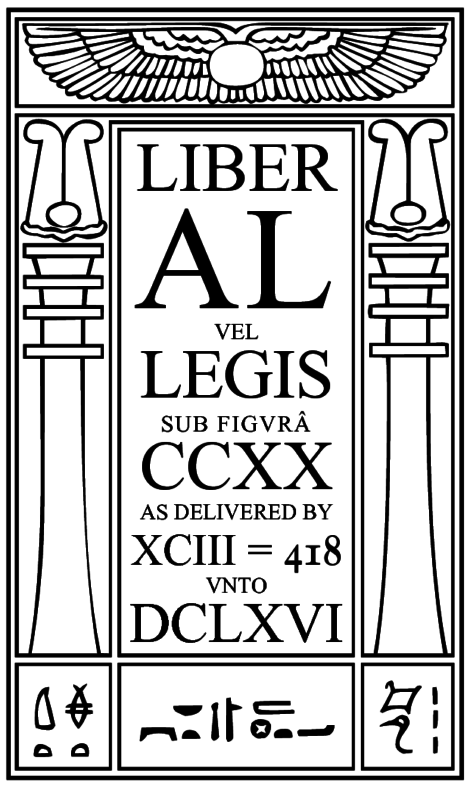
Cover page of the Liber AL vel Legis. Since its appearance, it keeps inspiring – and annoying – people all over the world. Ironically Crowley himself declared several times to be »annoyed« by the Book of the Law.
With such verses, and the lifestyle of its »prophet« the book of the law keeps earning strong reactions, until today even from people who consider themselves otherwise atheists or rationalists or even libertarians. A recent example is the obvious Crowley hater Richard T. Cole who spent considerable time and effort to prove that little Sunshine 666 »fabricated« in bad faith the Liber AL.
»Liber L. Vel Bogus – The Real Confession of Aleister Crowley« by Richard T. Cole
Since the beginning critics did question the legitimacy of the Liber Al or Liber Legis. Sometimes Aiwass is psychologized in the one way or another, at other times Crowley’s propensity to narcotics is seen as the source of the Liber AL, sometimes bad faith is assumed. Richard T. Cole promises hard evidence for the latter. In his »Liber Bogus« Cole attempts the proof in three parts: In the first part of his book, he depicts Crowley as a narcissistic psychopath of bad character. It is not really hard to follow Cole in this part, even though some allegations seem unfair, harsh or maybe a little bit misleading. Very soon Cole starts to lack style. But then again, who else, if not the great wild beast can make people lose their temper and manners even if already long dead and gone? The packaging of the second part becomes trickier and interesting: Cole demonstrates several inconsistencies in Crowley’s own accounts surrounding the Liber AL and the story of its reception. Most of them refer to the many scribbles in Crowley’s various diaries or their missing. Especially the missing of diary entries serves now as proof. This would be convincing if we had later diary entries, which would demonstrate sustained efforts in creating the Liber AL. But such evidence is not presented, and the scribbles invoked by Cole are tiring because they need way too many assumptions and interpretations to yield the desired result: none of these is conclusive by itself and it remains hard to follow Cole here. Three arguments, however, seem sound: 1) Crowley stated he lost the Liber AL after its reception and rediscovered it only in 1909. However, as we have seen already, Crowley obviously worked on it and classified it as an example of »genuine automatic writing« in 1907 as he intended to publish it in his Collected Works. Cole takes this as evidence that Crowley is not sincere in regard to the reception story.
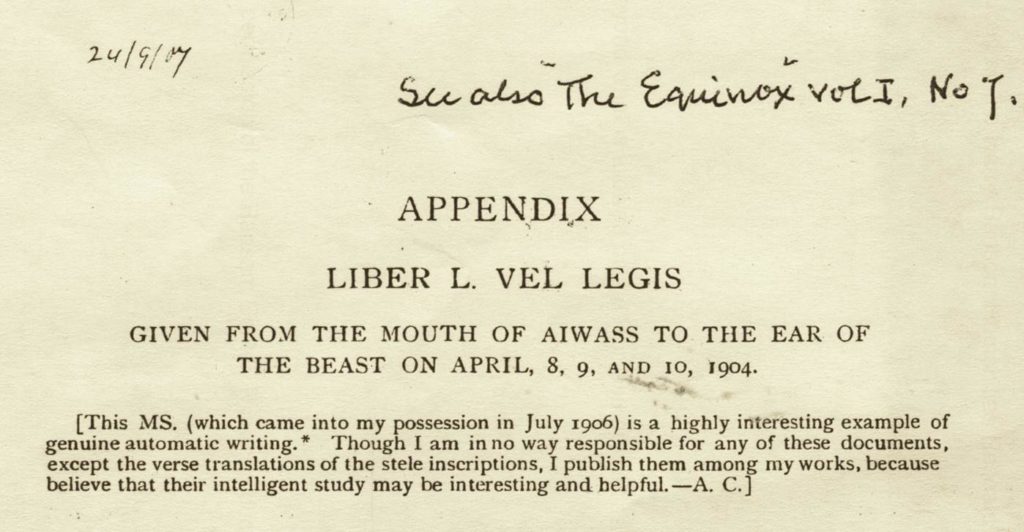
Crowley’s first attempt to publish the Liber Legis in his Collected Works in 1907. The entire document is made available at Lashtal.com (User account needed to download). Cole considers this a »proof« of Crowley’s faking of the Book of the Law.
He also overstretches here quite a lot the importance of the word »genuine«, and the comment »came into my possession in July«. Crowley clearly stated in the same document that it was received by his own magical personality (The Beast) in 1904. Came into possession means in this context nothing else, that he, Aleister Crowley, the man, did stumble upon the transcript (again) after forgetting about it. Every magician worth his wand should have some of these in his cellar.
» Liver L. Vel Legis Given from the mouth of Aiwass to the ear of The Beast on April 8, 9 and 10, 1904 [This Ms (which came into my possession in July 1906) is a highly interesting example of genuine automatic writing. Though I am in no way responsible for any of these documents, except the verse translations of the stele inscription, I publish them among my works, because I believe that their intelligent study may be interesting and helpful.A.C.”]«
The rest of the comment can be interpreted that little Alick just did not know what to do with the Manuscript back at that time, and what to think about it. This is also pretty much in line with what Crowley told later about the matter. And seemingly, Crowley was referring to this time in chapter 60 of his autohagiographical confessions, which we already cited before: »The Book of the Law annoyed me; I was still obsessed by the idea that secrecy was necessary to a magical document, that publication would destroy its importance«. This very insightful comment is made as Crowley describes how he sent the Manuscript of the Liber AL to Fuller. It is striking that Cole discusses the Fuller encounter in depth but leaves these passages out. Obviously, they run counter to his agenda. The second argument, which could constitute a hard fact is highly unlikely data given by Crowley for the time after the reception of the Liber AL. Cole seems convinced that it would be nearly impossible for Crowley to already be in Paris on the 26th of April, where he dined with Arnold Bennett, assuming that on the 24th Crowley was still in Cairo. Arnold Bennet himself mentioned his meeting with Crowley in his »Paris Nights: And Other Impressions of Places and People«. Moreover, Crowley met Annie Bessant on his nearly 4,000 km journey. Applying the rule of the three to the distance Cairo – Paris and comparing it with Crowley’s Way from Colombo to Cairo Cole convincingly concludes that this would be impossible. For the records: Even if this was true, it would not mean that Crowley wouldn’t have been in Cairo two weeks before, to receive the Liber AL. It just would mean that he misdated the day of his departure. The folks on the forum at Lashtal.com put some serious effort into researching this argument, including checking all relevant timetables for the relevant ferries. And, they found the clear result, that Uncle Al could very well be on time in Paris and meeting Beasant if he would have taken the Ship »Isis«, the sister ship of the »Osiris« Crowley mentioned. This would be in line with Bennett, Beasant and Crowley, except for the shipname. The entire argument is lengthy and includes several corrections of data, among them a misdating by the authoritative Crowley Biograph Symonds, which Cole used without further fact-checking. The conclusion is that Crowley was in Cairo when he received the Liber AL from the 8th to 10th April and met Bennett on the 26th in Paris. The entire argument can be read here.

Page 60 from the handwritten manuscript of the Liber AL vel Legis. The origins of the manuscript or at least, their status are still subject to debate – for some. Cole claims the paper stems from 1905, which would make a reception of the Liber AL in 1904 impossible. Clear evidence is not presented.
But the most serious argument against Crowley’s version of the 1904-reception of the Liber AL is the paper on which the original manuscript is written. Watermarks on every page show without a doubt that it was produced by Scottish Papermaker Alex Pirie & Sons. However, the »London Brand« of »Standard Typewriting« was »not commercially available until late in 1905« – this argument is deadly to any claim that Crowley would have received the Liber AL in 1904. However, Cole mentions that this would be according to »company archives« but fails to show any evidence. And furthermore, he does not explain why Aleister Crowley, Lord of Boleskine in the Scottish Highlands would desperately need the London Brand of Scottish Papermaker Alex Pirie & Sons. The company, by the way, merged in 1921 with Wiggins, Teape & Alex. Pirie Limited, merged again with Appleton Papers in 1991 and in 1999 they merged with Arjomani Piroux into the French-based company ArjoWiggins. Whoever is up for the challenge may contact them on their website and ask whether such company archives about the commercial availability of the »London brand« exist, and whether »Standard Typewriting« may have been available in Scottland or at least – uncommercially? Overall, the Liber Bogus promised a lot, but was a very weak read and lacking sufficient fact checking and documentation, where it was needed the most. On the other hand, the author displayed several incidents of attention seeking behavior. I admit, he succeeded for a short while. Many Thelemites meanwhile declared that the content of the Liber AL would stand very well for itself, but obviously, it bothered many.
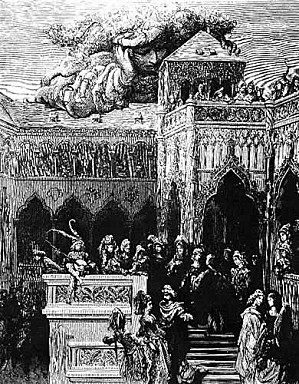
The »Abbey of Theleme«. Illustration by Gustav Dore in the early 19th century, depicting the life of the »thelemites« in Rabelais novel »Gargantua«
A much more interesting and worthwhile connection is the relation to Rabelais and his »Gargantua«.
Rebalais and the »Thélèmites« in »Gargantua«
Sometimes critics note a certain similarity between Crowley’s »Thelema«, its central dictum »Do What Thou Wilt« and the monks of a certain anti-monastery »Abbey of Theleme« in the satirical novel »Gargantua and Pantagruel«, written by the medieval monk and author François Rabelais. The »Thélèmites « living in Rabelais’ Abbey, which was build by the Giant Gargantua were maybe early anarchists:
»All their life was regulated not by laws, statutes, or rules, but according to their free will and pleasure. They rose from bed when they pleased, and drank, ate, worked, and slept when the fancy seized them. Nobody woke them; nobody compelled them either to eat or to drink, or to do anything else whatever. So it was that Gargantua had established it. In their rules there was only one clause:
DO WHAT YOU WILL
because people who are free, well-born, well-bred, and easy in honest company have a natural spur and instinct which drives them to virtuous deeds and deflects them from vice«
It is not clear whether »Aiwass« was inspired by Rabelais’ »Fais ce que veulx« or not. Crowley proactively addressed the issue himself as early as of 1926 stressing that »Love, and do what thou wilt« would appear for the first time with St. Augustine (Aleister Crowley: The Antecedents of Thelema. 1926). Then, after pointing to Gargantua and analyzing in detail the many similarities, Alick asks in a very Crowleyan manner the really important question: whether Rabelais was »aware of the prophetic fire of his immortal book«? Indeed, this approach is much more elegant, than to puzzle whether Crowley or Aiwass would have built on Rabelais, but the other way round, Rabelais is declared a prophet which anticipated the arrival of »Master Therion« AKA »Frater Perdurabo« (Crowley’s first magical motto in the Hermetic Order of the Golden Dawn) and even predicted his very name:
» ›How praiseworthy he Who shall have perserved even unto the end!‹ He who is able to endure unto the end, he insists, is to be blessed with worship. And what is this I will endure unto the end but PERDURABO, the magical motto at his first initiation of the Master Therion?« Aleister Crowley: The Antecedents of Thelema. 1926
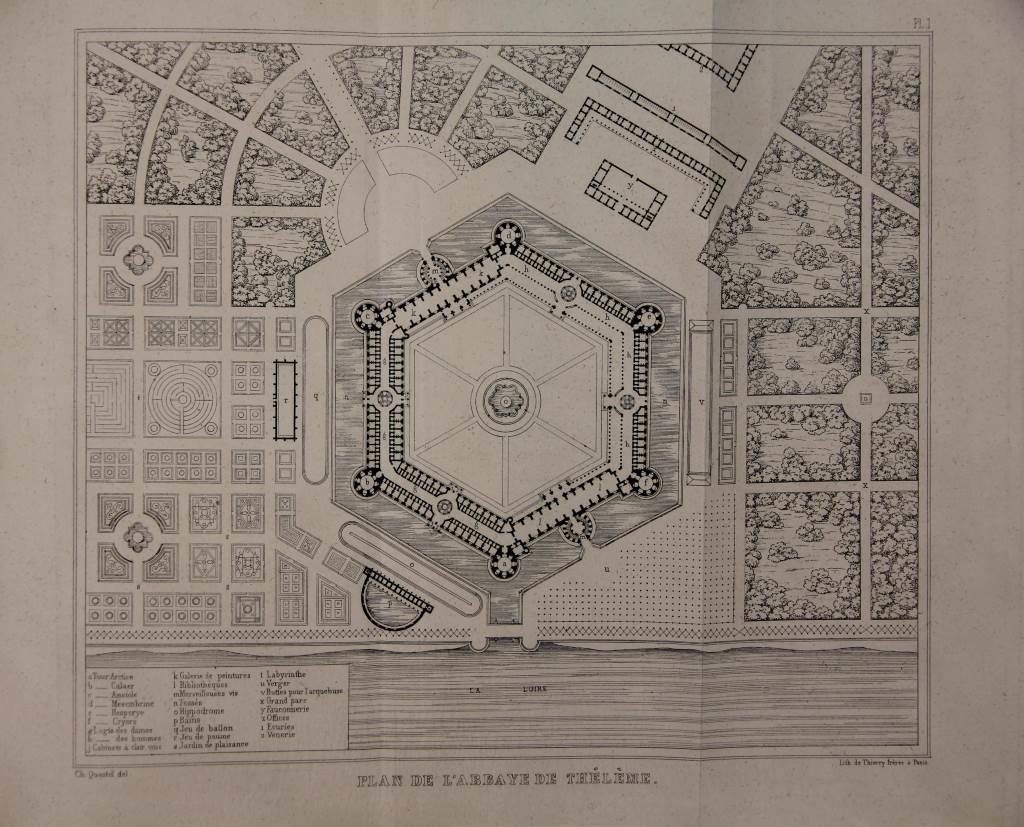
Floor plan for »Abbey of Theleme« by Charles Lenormant in 1840. While some argue that Crowley would have built on Rabelais, it is hard to see many similarities between Crowley’s Thelema and the novel, except for the name. Already the definitions of will are contradictory.
It is clear, that we cannot expect serious answers from a permanent jokester like Crowley on that matter. At the end of the day, the Liber AL and the definition of »Will« differ from Rabelais as much as from St. Augustine and as such, they will continue to play a rule as a unique impetus to modern occultism and Western Esoterism per se. Much more, Crowley and his Book of the Law repeatedly served as multiplier, influencing entire currents such as modern Witchcraft (via Gardner), the modern Left-Hand Path (via LaVey, which let to Aquino), modern magic in general, first via the Equinox, then via his student Israel Regardie (whose Golden Dawn revelations were possible only through Crowley) or via the Fraternitas Saturni and its several publications in the 20th century, to name just a few, and to leave out the obligatory pop-culture examples such as the Beatles. For me, the Liber AL’s »Every man and every woman is a star« is a beautiful reminder of our human nature. And Hadit, the sun god is not separate from the stars, as opposed to so many other traditions before. This is an idea, so powerful, that Giordano Bruno had to give his life for it. But the Liber Al was the first to make this a central teaching.

www.Nettlesgarden.com – The Old Craft


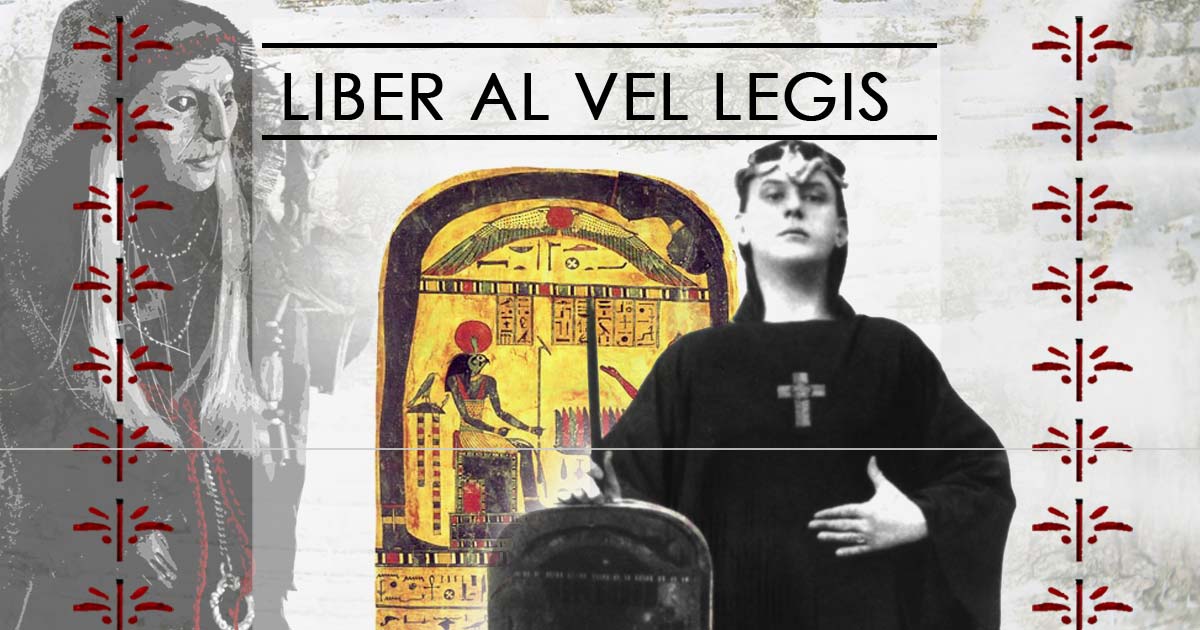
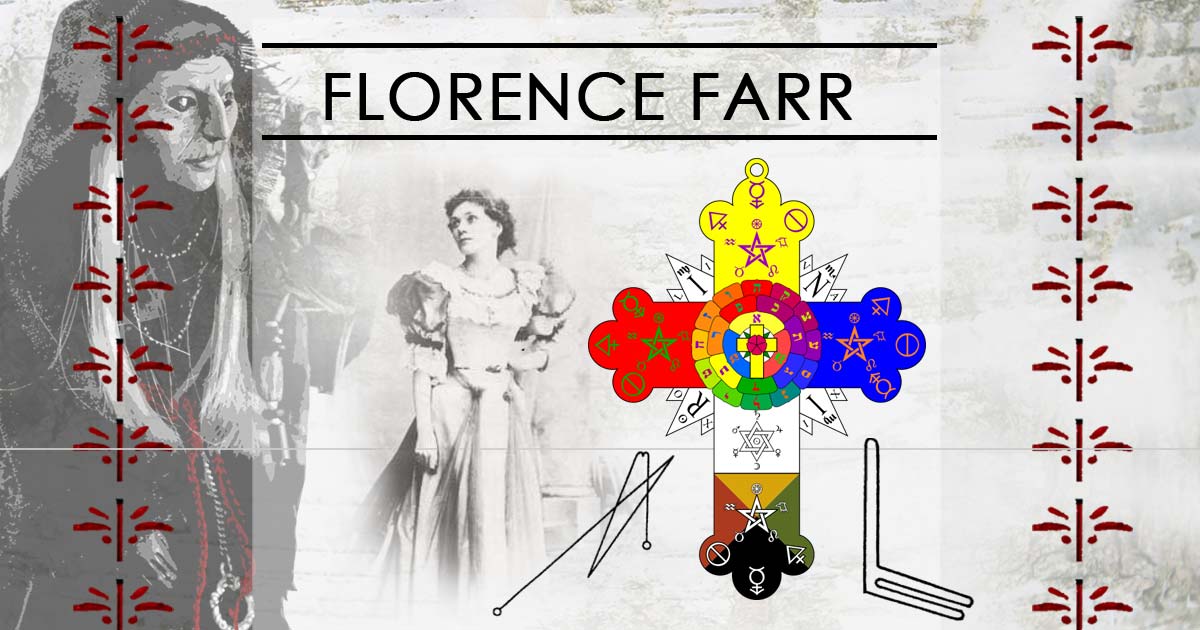
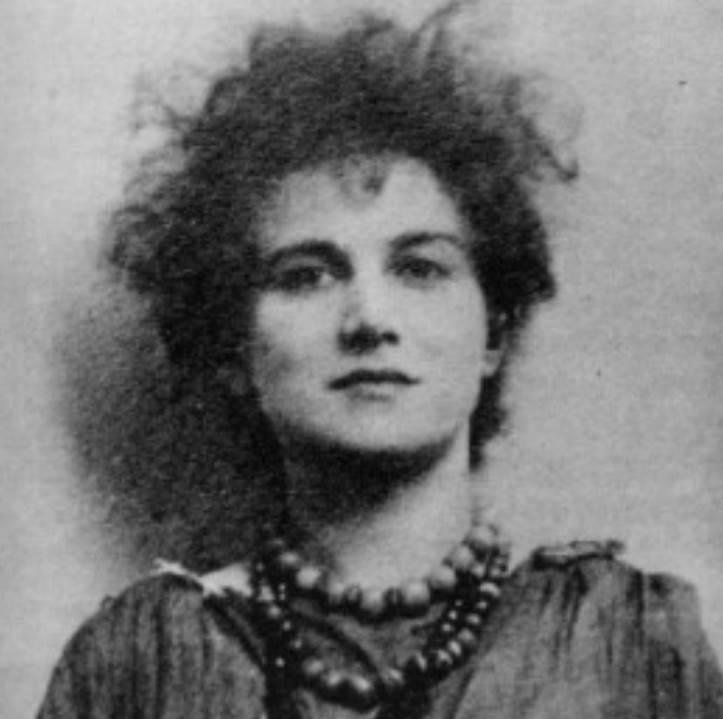

William Thirteen | April 17, 2018
|
Enjoyed your summation. However, I disagree with your description of the Conference in Hohenleuben (Weida). Decisions regarding OTO leadership had already been made prior to the meeting. Crowley’s stay in Hohenleuben was intended to discuss organisational issues and publishing projects. It quickly became clear that the two men could not work together. However, it was Tränker’s inhospitality which estranged him from his colleagues, and resulted in the closing of the Pansophical Lodge. Reforming without Tränker as the FS, Grosche, Grau & Co. continued working with Crowley well into 1928.
Alexander | April 17, 2018
|
Hi William,
you are perfectly right – this is the common reception in literature. and the conference alone is worth an article on its own.
I considered for this article relatively fresh sources, made available by private scholar Volker Lechler, who had the luck, initiative, and patience to gather primary documents from governmental (even Moscow military archives) and mail correspondences around many protagonists around the early Fraternitas Saturni and Pansophical lodge. I cannot but recommend the fascinating read to anyone familiar with German (http://magie.de/MagieWP/die-ersten-jahre-der-fraternitas-saturni/) and will be for sure back on this subject.
At the end of the day, it still will remain a matter of taste how to evaluate the whole situation.
Alexander Duncan | November 21, 2018
|
The Equinox began publication in 1909, so Crowley could not have planned to publish the Book of the Law in The Equinox in 1907. Perhaps this is a misprint or perhaps these proofs are for the Collected Works, Vol. III of which was published in 1907.
Alexander | November 21, 2018
|
Thank you for pointing this out. This is also what Lashtal.com was writing when they made the document available. The error was mine alone and is now corrected.
All the best
Edward | June 25, 2019
|
Nice attempt to shore up the tottering edifice of Crowleyanity… I am sorry, but what you address here about the “Liber al vel Bogus” is (I think) deliberately selective. There is a far more evidence in the book about Crowley faking the entire Cairo/Book of the Law revelation. And, it is inarguable that the timeline that Crowley claimed, as well as a host of other details, are a complete fabrication.
Like the majority of other religious leaders Crowley invented his “received wisdom”‘; and invented the whole set of events around it.
From a magickal perspective this may not make much of a difference, as magick is about creating and applying belief. I am not disputing Crowley’s magickal capabilities; (though these, too, were exaggerated by him.) What I am pointing out is that the religious aspect of the Crowley cult is built on nothing but lies. And, not the “enlightened” lies of some inscrutable Master. But, the lies of a psychopath and con artist who wanted to be a god.
For the record: yes, I am a disaffected occultist; but, no I have not converted to Christianity or some other orthodoxy. I am just sick to death of Crowleyite sycophants going on and on about his “genius” and “innovation”. What little there is of value in his theories and methods he stole from a wide variety of other sources. And, the rest is just his tired egomania dressed up as divine inspiration.
Kris | November 6, 2021
|
Crowley’s treatment of Liber L Vel Legis, strongly suggests he was deeply frustrated by the text suspecting secrets that lied beyond his understanding. I suspect the suggestion that he had lost or misplaced the text were not entirely as he represented, but rather he spent a great deal of time trying to unravel certain deeper meanings within the text some of which he would sadly never understand leading to his later warning that the study of the text should be forbidden as it may move men to madness. I am not passing judgement on the majority of Crowley’s works some of which are to put it kindly tough going, only indicating that the Book of the Law is of a very different tone and may be more appropriately judged as a stand alone text.